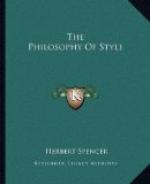60. Equally, throughout the whole nature, may be traced the law that exercised faculties are ever tending to resume their original state. Not only after continued rest, do they regain their full power not only do brief cessations partially reinvigorate them; but even while they are in action, the resulting exhaustion is ever being neutralized. The two processes of waste and repair go on together. Hence with faculties habitually exercised—as the senses of all persons, or the muscles of any one who is strong—it happens that, during moderate activity, the repair is so nearly equal to the waste, that the diminution of power is scarcely appreciable; and it is only when the activity has been long continued, or has been very violent, that the repair becomes so far in arrear of the waste as to produce a perceptible prostration. In all cases, however, when, by the action of a faculty, waste has been incurred, some lapse of time must take place before full efficiency can be reacquired; and this time must be long in proportion as the waste has been great.
ii Explanation of Climax, Antithesis, and Anticlimax.
61. Keeping in mind these general truths, we shall be in a condition to understand certain causes of effect in composition now to be considered. Every perception received, and every conception realized, entailing some amount of waste—or, as Liebig would say, some change of matter in the brain; and the efficiency of the faculties subject to this waste being thereby temporarily, though often but momentarily, diminished; the resulting partial inability must affect the acts of perception and conception that immediately succeed. And hence we may expect that the vividness with which images are realized will, in many cases, depend on the order of their presentation: even when one order is as convenient to the understanding as the other.




